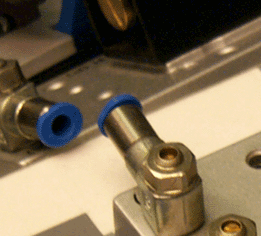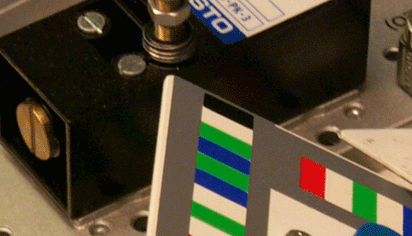|
|
|
INTRODUCTION
The requirements for DERIVE come from
the demands of vocational and engineering schools and their
links to industry. Increasing pressure is placed on vocational
schools to expose students to real working environments and
to support the education and training of multi-skilled technicians.
This led to a new type of job profile - a mix of electrical,
mechanical and IT knowledge called Mechatronics. DERIVE fulfills
essential target demands by developing and evaluating a new
kind of multi-perspective learning environment for mechatronics.
Furthermore, the market for innovative training systems for
mechatronics will be initialised and extended.
TARGET DEMANDS
Mechatronic systems play a key role in modern automation
technology.
It is obvious, that the dissemination of mechatronic systems
simultaneously requires adequate service techniques. Mechatronic
components can be easily integrated into telematic environments
and corresponding work-concepts for tele-service such as remote
diagnosis and maintenance of mechatronic systems. Mechatronics
is therefore an enabling technology for tele-service.
The emergence of remote diagnostic systems has an appeal to
companies because it allows the maintenance and service of equipment
to be undertaken with greater efficiency. Problems can be diagnosed
off site, and the appropriately qualified staff and equipment
can be despatched to solve problems.
The increasing dissemination of mechatronic
systems in combination with tele-service implies new demands
to the skilled worker in this field.
Work in mechatronics requires knowledge of structure, behaviour
and function of mechatronic systems. It also requires cognitive
and operational knowledge about building systems, diagnosis
and maintenance. A significant innovation is, however, the fact
that working processes now are essentially characterised by
the use of telemedial systems. In the professional field users
need the ability to achieve their aims in (tele) co-operation
with others, and they should be able to co-operate in virtual
and supranational forms of organisation. Both, the professional
and the social-communicative part of the working tasks are concerned.
Schools are required
to expose students to the types of equipment and situations
they may experience in the workplace.
With the increasing complexity of production systems it is unrealistic
for schools to be able to simulate adequately the full range
of systems operated in the industrial sector. Therefore, a co-operation
with other industrial partners is required. It is evident that
many industries using vocational and engineering schools are
pan-European or international. This situation requires staff
to meet at central locations to take part at common courses.
This is very costly and the key staff is off the company for
several days. On the one hand there is a move in many countries
towards an emphasis on multi-skilling and a European harmonisation
of training courses.
On the other hand, there are no elaborated concepts concerning
pedagogical, technical and organisational aspects, particularly
in the emerging field of mechatronics. Cultural differences
and similarities concerning learning and collaboration styles
can be noticed but haven't been integrated into curricula, courseware
and teaching methods. |
TOP
|
|




